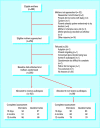Provision of taped conversations with neonatologists to mothers of babies in intensive care: randomised controlled trial
- PMID: 17142256
- PMCID: PMC1764090
- DOI: 10.1136/bmj.39017.675648.BE
Provision of taped conversations with neonatologists to mothers of babies in intensive care: randomised controlled trial
Abstract
Objective: To determine whether providing mothers of babies in neonatal intensive care units with audiotapes of their conversations with a neonatologist improves recall of information and psychological wellbeing.
Design: Randomised, single blinded trial.
Setting: Neonatal intensive care unit, North Queensland, Australia.
Participants: 200 mothers of babies in a neonatal intensive care unit.
Interventions: Mothers given (n=102) or not given (n=98) audiotapes of their conversations with a neonatologist.
Main outcome measures: Recall of information, attitudes to and use of the tape, satisfaction with conversations, postnatal depression, anxiety, general health, and stress about parenting, at 10 days and four and 12 months.
Results: 91% (n=93) of mothers in the tape group listened to the tape (once by day 10, twice by four months, and three times by 12 months; range 1-10). At 10 days and four months, mothers in the tape group recalled significantly more information about diagnosis, treatment, and outcome than mothers in the control group. At four months mothers in the tape group were 75% more likely to recall all of the information about treatment than mothers in the control group (59% v 34%; risk ratio 1.75, 95% confidence interval 1.27 to 2.4). Six mothers, all in the control group, could not recall their conversations. No statistically significant differences were found between the groups in satisfaction with conversations (10 days), postnatal depression and anxiety scores (10 days, four and 12 months), and stress about parenting (12 months).
Conclusion: Providing the mothers of babies in neonatal intensive care units with audiotapes of conversations with a neonatologist enhanced their recall of information (up to four months). The taped conversations did not affect the mothers' wellbeing or satisfaction with the neonatologist.
Trial registration: Australian Clinical Trials Registry 12606000478516.
Conflict of interest statement
Competing interests: None declared.
Comment in
-
Communicating with parents on the neonatal unit.BMJ. 2007 Jan 6;334(7583):1. doi: 10.1136/bmj.39063.441076.BE. BMJ. 2007. PMID: 17204769 Free PMC article.
-
Lessons from the current literature.Semin Fetal Neonatal Med. 2007 Jun;12(3):224-5. doi: 10.1016/j.siny.2007.03.001. Semin Fetal Neonatal Med. 2007. PMID: 17633768 No abstract available.
References
-
- Harrison H. The principles for family-centered neonatal care. Pediatrics 1993;92:643-50. - PubMed
-
- Kmietowicz Z. Premature baby was not put on ventilator. BMJ 1996;313:963. - PubMed
-
- Learning from Bristol: the Department of Health response to the report of the public enquiry into children's heart surgery at the Bristol Royal Infirmary 1984-1995. Norwich: Stationery Office, 2002:136.
-
- Koh TH, Jarvis C. Promoting effective communication in neonatal intensive care units by audiotaping doctor-parent conversations. Int J Clin Pract 1998;52:27-9. - PubMed
Publication types
MeSH terms
LinkOut - more resources
Full Text Sources
Medical

